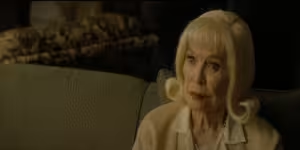Tilman Singer’s creepy and cool sophomore film features committed performances by Hunter Schafer and Dan Stevens

Tilman Singer’s Luz broke onto the film festival scene back in 2018; while the idea of a more police procedural take on a possession drama is already an exciting take, Singer’s debut made its mark by marrying its visual love for giallo slashers with an immersive soundscape that expanded the imaginative horizons of what was mainly a single-room thriller.
It’s been way too long until Singer’s follow-up Cuckoo, but his sophomore effort finds the German filmmaker expanding his creative scope to bloody new heights. Anchored by equally committed performances by a fearless Hunter Schaefer and a menacingly sweet Dan Stevens, Cuckoo is a paranoid, visually stunning roller coaster ride that, with Oz Perkins’ Longlegs, adds another jewel to NEON’s crowning year of horror.
After a stateside tragedy, Schafer’s Gretchen is trapped in the Bavarian Alps with father Luis’ (Marton Csokas) new family–stepmother Beth (Jessica Henwick) and mute sister Alma (Mila Lieu)–as they set down new roots at Luis’ new job, a mountain resort owned by the charming Herr König (Dan Stevens). Seeking to give Gretchen an escape from the boredom of being cooped up for the summer, König hires Gretchen to watch the resort’s front desk. However, Gretchen quickly discovers that despite her new home’s pastoral flair, nothing is quite as it seems. Female guests wander in a daze, occasionally vomiting on the spot; young Alma is suddenly prone to seizures; weird, vibrant bird calls come from the forest beyond; and, most importantly, Gretchen isn’t allowed to stay out after dark…
Much like Luz, the vibes and location of Cuckoo feel just out of joint with reality. Despite being set in the modern day, the resort and nearby hospital feel trapped in the wood panels, tacky wallpaper, and fluorescent-lit modernism of the 1970s. Despite the chic, natural feel, everything feels held together by something sinister brewing beneath the surface–augmented by the placating mannerisms of Herr König and his staff. Also clashing with modernity is Singer’s formalism, echoing classic cabin-in-the-woods slashers like Friday the 13th, conspiracy thrillers like The Stepford Wives, the dreamlike horror of Suspiria, and even the body horror of something like The Brood. There are languid, expansive shots of dark forests, uncomfortably intimate closeups of thrumming vocal cords underneath skin, and sounds that feel like they come from everywhere and nowhere.
Fittingly, Gretchen is a completely modern final girl, quick with her blunt, piercing words as much as she is with her trusty butterfly knife. While she initially feels like another angsty teenager, Gretchen is queer as hell and completely ready to call out creepy actions and dialogue as they happen. Despite all this, the adults around her are quick to infantilize her and normalize what’s going on, all while falling under the spell of whatever the hell is going on. As a result, Gretchen isn’t just trapped in a creepy resort: she’s a 2020s teenager very much trapped in a 70’s horror movie. It all collects in a wonderfully tense and paranoid atmosphere that feels wholly inescapable, one that painfully externalizes in the immobilizing injuries Gretchen endures as she tries to evade and explain the mysterious goings-on at the resort.
Central to Cuckoo‘s maniacally fun creep factor is Dan Stevens, who expands his brimming portfolio of humorous heathens with Herr König. Where Schafer defines herself by her ability to call out horrors when they crop up, Stevens is mesmerizingly keen at masking them under an air of gentility and slick bilingual charm. As the film goes on, König’s zinging lilt gives way to a sharp bark as his mask drops–yet Stevens’ campy flair lets both Gretchen and the audience in on his inner menace even as the other characters take him at face value.
Where Luz found a propulsive pace in establishing its locked-room, spectral cat-and-mouse thriller right off the bat, what energizes Cuckoo is Singer endlessly toying with our expectations of what film we’re actually watching. Is the hotel masking some pseudo-scientific cult? Is this an all-in-her-mind thriller? Is this a Cronenbergian body horror creature feature? Singer crafts a potent blend of possibilities where so much feels possible; even as the film inevitably narrows its scope to a gruesome chase scene, Singer doesn’t limit the sense of subgenres that Cuckoo can belong to.
This universal approach to horror showcases how adept Singer is at molding the suspense of Cuckoo for whatever the moment calls for. His love for sound finds new depth here, particularly in developing a signature “Cuckoo call” that feels both synth-based and organic. Where Luz is starkly lit, Cuckoo embraces the dark, inventively playing with dappling light to both reveal and hide whatever lurks in the blackness (particularly in a banger of a sequence involving Schafer feeling something on a bicycle). As the film goes on, Singer takes a cryptic and hallucinatory approach to cryptids–with their abilities affecting the film as scenes vibrate and loop when one least expects it. It’s so dang cool that a film this weird looks and sounds this good–bringing to mind the stunning, bonkers antics of Gore Verbinski’s underrated A Cure for Wellness at a time when such unpredictability finally seems to be in fashion with moviegoers.
It may be true that for all of Singer’s stylistic flair, some can view Cuckoo’s eagerness to play in these disparate genre sandboxes as an opportunity to showcase style over substance–nearly unconnected horror elements experiencing an identity crisis. However, it’s how Singer brings them together with Cuckoo’s underlying concerns–of being a stranger in one’s own family as much as one in a foreign land, and a lack of familial and bodily agency, among others–that helps Cuckoo’s thematic eggs feel like a part of a unifying nest.
Cuckoo had its Montreal premiere at Fantasia Fest on July 30th. It opens in theaters on August 9, 2024 courtesy of NEON.



